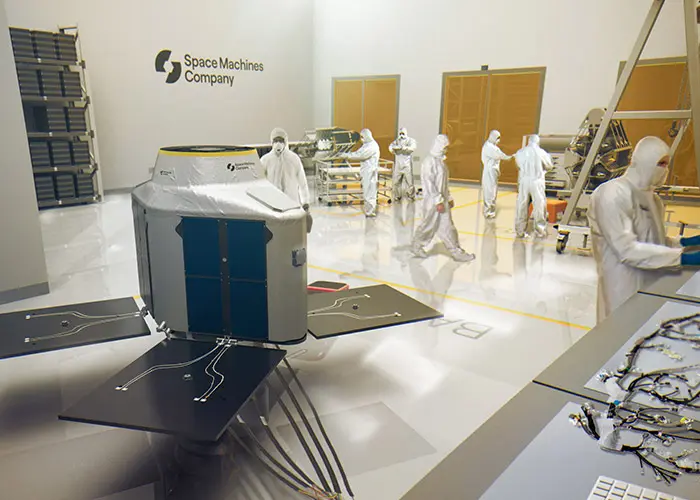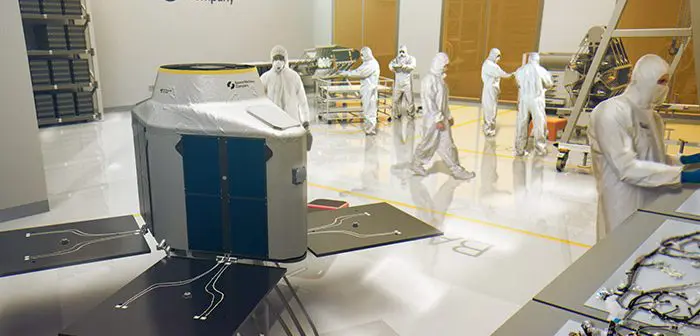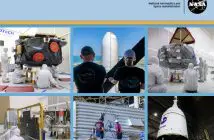
Space Machines Company (SMC) and the University of Technology Sydney (UTS) have announced the creation of Australia’s largest industrial-scale spacecraft manufacturing facility and renewed their partnership for another three years.
Located at UTS Tech Lab in Sydney, the Optimus Factory marks a major milestone in Australia’s space industry, establishing critical sovereign capability for the design, assembly and testing of 300 kilogram class spacecraft at scale.
The expanded facility will boast an additional 800-square-metre spacecraft production space. It will house Australia’s largest satellite assembly, integration and test cleanroom. This asset, which will support future defence requirements, represents a co-investment from both parties and will bolster national security and commercial applications, enabling SMC to deliver immediate, high-fidelity intelligence and safeguard critical space assets. This space production capability exemplifies the Future Made in Australia vision, namely building domestic industrial capacity in critical technologies.
The facility will have the capacity to produce five Optimus Viper spacecraft simultaneously, scaling to 20-plus units per year. Announced in December 2024, Viper is SMC’s rapid-response spacecraft variant currently under development as an evolution of their first vehicle, Optimus.
The facility is scheduled to be operational by late 2025, with production of multiple SMC Viper spacecraft expected to commence in early 2026. Upon completion, it will be the largest satellite assembly facility in Australia.
Space Machines Company also received an AUD8.5 million grant from the Australian Government in 2024 under the Australian Space Agency’s ISI India Projects program for a collaborative demonstration mission, Space Maitri, between India and Australia using the Optimus Viper platform.
“OF-01 marked a historic transformation in Australia’s sovereign capabilities, shifting our nation from a consumer to a producer of critical space infrastructure to close Australia’s space production gap at a pivotal moment in Indo-Pacific security,” says Space Machines Company CEO Rajat Kulshrestha.
“Space Machines Company is one of the few companies globally developing capabilities that ensure freedom of movement in space and the only one headquartered in the Indo-Pacific region,” he continued. “This strategic capability positions Australia to make significant contributions to allied space security efforts, particularly with the United States, as countries look for technologies that can quickly safeguard critical space infrastructure.”
“This partnership is focused on joint research and development, enabling UTS and SMC to shape the future of the space industry in Australia and globally, said Professor Michael Blumenstein, UTS Pro Vice-Chancellor (Business Creation and Major Facilities). “It also provides UTS students and researchers with access to leading-edge technology and real-world experience, placing them at the forefront of space innovation.”
“Until now, Australia has been largely dependent on overseas suppliers for space assets and technology, limiting our strategic autonomy and industrial growth,” he added. “By establishing local manufacturing capabilities, we’re creating high-skilled jobs and retaining intellectual property within our borders, ensuring Australia can independently develop, produce, and deploy the space infrastructure essential for our future security and prosperity.”
Professor Andrew Parfitt, UTS Vice-Chancellor and President, said the renewed partnership with SMC demonstrated the university’s commitment to research-led innovation and industry collaboration.
“Our long-term partnership with Space Machines Company is helping to shape the future of Australia’s space industry,” Parfitt said. “By combining deep research expertise with advanced manufacturing capability, we’re creating new knowledge and technologies while giving our students and researchers the opportunity to work on the frontier of space innovation,” Professor Parfitt said.
“Through this collaboration, UTS is not only contributing to the development of sovereign space capabilities – we’re building the skills, experience and infrastructure that will define Australia’s role in the global space ecosystem.”
“The OF-01 facility represents an exciting leap forward for Australia’s space industry,” said Australian Space Agency Head Enrico Palermo. “This collaboration between Space Machines Company and UTS Tech Lab showcases Australia’s commitment to being an active, capable partner in the international space community. It will help drive the Australian Government’s agenda to grow our nation’s industrial capability, boost productivity, build economic resilience and create a fairer society.”





